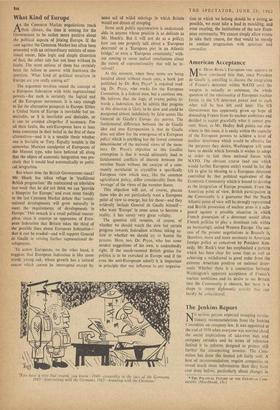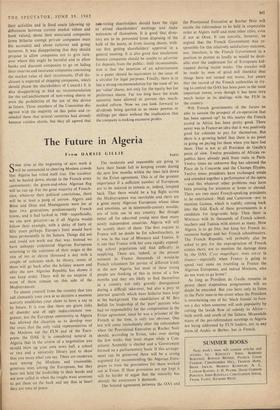The Jenkins Report
o serious person expected sweeping revolu- tionary recommendations from the Jenk ins Committee on company law. It was appointed at the end of 1959 when everyone was worried about the social implications of take-over bids and company swindles and its terms of reference limited it to reforms designed to protect still further the unsuspecting investor. The Com- mittee has done this limited job fairly well. A host of recommendations require companies to reveal much more information than they have ever done before, particularly about changes in * THE POLITICAL FUTURE OF THE EUROPF AN COM- MUNITY. (Marshbank, 15s.) their activities and in fixed assets. (showing up differences between current market values and book values), about their associated companies (even hitherto exempt private companies must file accounts) and about turnover and group turnover. It was disappointing that they should propose to allow companies not to give turn- over where this might be harmful and to allow banks and discount companies to go on hiding their reserves and insurance companies concealing the market value of their investments. (Full dis- closure is expected of shipping companies, which should please the shareholders of Cunard.) It is also disappointing to find no recommendation for the enfranchisement of non-voting shares or even the prohibition of the use of this device in future. Three members of the Committee dis- agreed with the majority on this point and re- minded them that several countries had already banned voteless shares, but they all agreed that nas-voting shareholders should have the right to attend shareholders' meetings and make nuisances of themselves. It is good that direc- tors are to be prevented from disposing of the bulk of the assets, or from issuing shares, with- out first getting shareholders' approval in a general meeting. It is also good that mushroom finance companies should be unable to advertise for deposits from the public: their recommenda- tion is that the insertion of an advertisement in a paper should be equivalent to the .issue of a circular for legal purposes. Finally, there is at last a strong recommendation for the issue of 'no pat value' shares, not only for the equity but for preference shares. Far too long have the trade unionists been allowed to prevent this much- needed reform. Now we can look forward to dividends being quoted as so many -pennies or shillings per share without the implication that the company is making excessive profits.

































 Previous page
Previous page